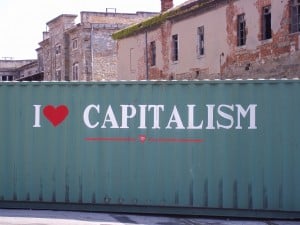By: Carol Pierson Holding
In his op-ed piece “Two Cheers for Capitalism,” conservative columnist David Brooks quotes fellow New York Times writer Anand Giridharadas about why capitalism isn’t working:
“The rich are to be praised for the good they do with their philanthropy, but they are never to be challenged for the harm they do in their businesses. … Sometimes I wonder whether these various forms of giving back have become to our era what the papal indulgence was to the Middle Ages: a relatively inexpensive way of getting oneself seemingly on the right side of justice, without having to alter the fundamentals of one’s life.”
I wonder why Brooks considers this statement “courageous” and “provocative” rather than stating the obvious.
Indeed, in 2014, World Bank Economist Apurva Sanghi made the same argument for business and its own form of Papal indulgence: “CSR (corporate social responsibility) is about companies ‘giving back’ … How can companies that produce products that are polluting the environment have a strong reputation for social and environmental responsibility?’”
Sanghi slams some CSR as just another form of the “’guilt complex’ - charity as a means of managing a potential backlash.” And surely that happens, as he points out, with oil companies and big tobacco. But when a company makes an operational decision that’s good for society, you can bet it’s also good for the business.
And when businesses band together with competitors to address a societal ill, it’s because the very heart of capitalism is threatened, as it is with climate change.
Will capitalists step up to climate change for their own survival?
The evidence seems to say yes.
We’ve all heard about climate-caused business disruptions – think Hurricane Sandy in New York and rising sea levels along the East Coast. But climate change affects both operations and consumer confidence.
The latest Yale/Gallup/Clearvision poll found 62% of Americans are convinced that “global warming is an urgent threat requiring immediate and drastic action,” indicating widespread fear.
Recall the stock market crash of 2008: when consumers are afraid, they don’t buy products and they don’t invest. As the impact of climate change gets worse, consumers may just stop spending. As temperature extremes worsen, they might just stay home.
And consumers are rewarding climate friendly companies by buying their products and their stocks.
The rest of business is jumping into action too.
Just a few days ago, the Huffington Post reported that eleven environmentally responsible corporations including Bank of America, Goldman Sachs, Walmart, and Apple joined Obama in "American Business Act on Climate Pledge." The purpose of the climate pledge? To support a "strong outcome" at the climate negotiations in Paris and commit to renewable energy, emissions reduction, responsible water use and halting deforestation.
Last year, even without the President’s backing, over 100 companies joined a coalition called We Mean Business to advocate bold action on climate change. Those companies were already climate leaders in their products (think electric cars and green investment funds) and operations.
We Mean Business now represents $2.19 trillion in members’ revenue and $7.4 trillion of investment.
Capitalism as practiced in 2015 America is a flawed system, distorted by years of legislation removing essential safeguards. But when it comes to climate change, capitalism might just be the most effective solution. Regardless of how weak you believe the connection is between profit and social responsibility, the connection between profit and public opinion has never been stronger.
Add to that the economic opportunities presented in the course of addressing climate change in both operations and consumer loyalty — opportunities such as Ikea discovering a solar gold mine in its massive flat roofs and the UK’s Marks & Spencer’s impressive gains in reducing carbon emissions while successfully relaunching its brand as the sustainable retailer — and you’re seeing capitalism at its finest.
Photo courtesy of Alessio via Flickr CC
 Carol Pierson Holding is President and Founder, Holding Associates. Carol serves as Guest Blogger for CSRHub. Her firm has focused on the intersection of brand and social responsibility, working with Cisco Systems, Wilmington Trust, Bankrate.com, the US EPA, Yale University’s School of Environmental Sciences, and various non-profits. Before founding Holding Associates, Carol worked in executive management positions at Siegel & Gale, McCann Erickson, and Citibank. She is a Board Member of AMREF (African Medical and Research Foundation). Carol received her AB from Smith College and her MBA from Harvard University.
Carol Pierson Holding is President and Founder, Holding Associates. Carol serves as Guest Blogger for CSRHub. Her firm has focused on the intersection of brand and social responsibility, working with Cisco Systems, Wilmington Trust, Bankrate.com, the US EPA, Yale University’s School of Environmental Sciences, and various non-profits. Before founding Holding Associates, Carol worked in executive management positions at Siegel & Gale, McCann Erickson, and Citibank. She is a Board Member of AMREF (African Medical and Research Foundation). Carol received her AB from Smith College and her MBA from Harvard University.
CSRHub provides access to corporate social responsibility and sustainability ratings and information on 15,000+ companies from 135 industries in 130 countries. Managers, researchers and activists use CSRHub to benchmark company performance, learn how stakeholders evaluate company CSR practices and seek ways to change the world.
